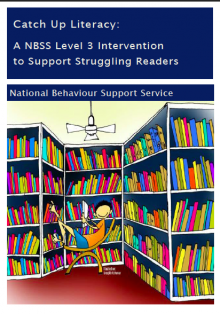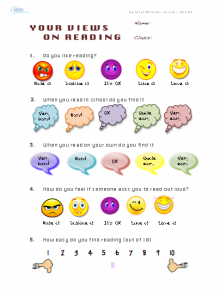NBSS research has pointed to the association between failure with reading and behaviour difficulties. For example, an exploration of the reading ages of students (N=2187) receiving NBSS Level 3 behavioural support from the Spring Term 2009 to the Spring Term 2012 revealed that 66.3% (N=1450) of students were reading three or more years below their chronological age. Additionally, 4.3% (N=96) of the students receiving NBSS Level 3 support had reading ages of 7 years or less.
The negative effect of poor reading skills are well documented and wide ranging, for example poor academic achievement, low self-esteem, lower motivation to read, disengagement with learning and school, and behavioural problems.
Greg Brooks (2007) in his review of ‘What works for pupils with literacy difficulties’, noted that ‘although good classroom teaching is the bedrock of effective practice, most research suggests that children falling behind their peers need more help than the classroom normally provides. This help requires coordinated effort and training’. For some students, a tightly focused group intervention will be sufficient to allow them to develop their reading skills and build their confidence to engage more actively in the learning process, while other students need intensive and individualised interventions.
The diversity of student needs, learning style, teaching style and classroom conditions that exist in any school means that no one ‘right’ strategy or programme holds the answer to addressing literacy difficulties. However, using evidence-based programmes as ONE element of targeted support can play an important role in a school’s repertoire of prevention and intervention supports for students. Catch Up Literacy is one of several interventions that NBSS partner schools implement to support reading and literacy skills development - other interventions include, for example, the use of Corrective Reading; Toe by Toe; Acceleread Accelewrite; Rapid Plus; Vocabulary Enrichment; Bridge to Vocabulary; SNIP Literacy programme; The Wordsworth programme; Spell Write Right, among others.
In 2010 Catch Up Literacy was introduced to partner schools as a NBSS Level 3 intensive, individualised intervention for students who were experiencing difficulties with reading. Catch Up Literacy intervention has been identified by the UK Department for Children, Schools and Families (DCSF) as an evidence-based Wave 3 intervention i.e. interventions that have been shown to provide effective one-to-one support for struggling learners.
It is a structured one-to-one reading intervention, carried out in two 15-minute individual teaching sessions each week. It includes elements of word, sentence and text level work and, where appropriate, oral language skills – the balance depending on the assessed individual needs of the student. The intervention begins with diagnostic/formative assessments enabling the teacher to set literacy targets, establish individual strengths and identify a focus for effective teaching, centered on a book of an appropriate level of difficulty.
During the two 15-minute sessions per week, per student, a range of skills, strategies and concepts are taught including phonological knowledge (visual and aural), sight recognition of high frequency words, cueing strategies and the links between reading and writing.
In November 2010, after an introductory session for school leaders, NBSS partner schools in Leinster were invited to participate and 37 teachers from 19 schools received Catch Up Literacy training. The training covered:
- background and research
- assessing reading skills and selecting appropriate books
- delivering the Catch Up Literacy individual teaching session
- ongoing monitoring
Catch Up Literacy training is accredited by the UK Open College Network which provides accreditation services for adult learning and is a recognised UK national qualification awarding body. Over half the teachers involved in the NBSS Catch Up Literacy intervention in 2010-2011 undertook this further study.
To monitor and evaluate the effectiveness of this intervention, all schools were asked to administer the following pre and post research instruments:
- The Salford Reading Test;
- NBSS Student Attitudes to Reading Survey;
- NBSS Student Learning Behaviour Checklist.
Overview of Catch Up Literacy Intervention Key Findings 2010-2011
Participants
- 73 pupils
- Average Chronological Age (CA) at start of the project 13 years 9 months
- Average Reading Age (RA) at start of the project 7 years 9 months
Intervention
- Average 5.32 months of Catch Up Literacy intervention
Outcomes
- Average Reading Age gains of 16.78 months
- Average Ratio gain (gain divided by duration of intervention) of 3.37
(where a ratio gain of at least 2 may be considered ‘good impact’, Brooks 2007) - More than 70% of the participating students achieved a Reading Age gain of more than twice the duration of intervention
- At the end of the intervention period, approximately 20% of the participating students achieved the ceiling test score (10 years 7 months) - i.e. they may be said to be functionally literate.
Summary
| Intervention | N | Start CA | Start RA | End CA | End RA | Durations | Gain | Ration Gain |
| Catch Up Literacy | 73 |
165m 13y 9 |
93m 7y 9m |
171m 14y 3m |
110m 9y 2m |
5.32m | 16.78m | 3.3 |
Teacher Comments:
The following is a selection of comments from the teachers involved in the intervention.
“[He] is improving in his conduct in class and is much more engaged in learning than during the 1st term.”
“…has matured a lot over the last few months. His bad language and aggression have improved immensely…[his] reading and confidence to read has improved this year.”
“[She] hated reading at the start of the programme but grew in confidence with the one to one help. She has settled down much better in her mainstream classes recently and is more willing to attempt work and ask questions if she doesn’t understand something. She doesn’t like to admit that she enjoys reading though – it’s not cool!” this year.”
“[She] works brilliantly in a one to one situation and made great progress in the Catch Up Literacy. She became confident enough to read out in my main class which she had never done before. She has major impulsive and hyperactive tendencies so the mainstream class is more of a challenge for her.”
“[He] grew in confidence, was willing to read in class for the first time and his behaviour improved.”
“Before the intervention X believed she was not good at anything academic and would have to leave school…Many of (X’s) dockets for being uncooperative and aggressive in class were due to her constant and repeated refusals to read aloud in class. Now she is eager to read in class – even puts her hand up. Her selfesteem is still rather low however she now firmly believes she can read well and with confidence.”
“[He] can get frustrated easily in class. He enjoys one to one tuition. This is where he really shows progress. [He] loves being read to and always pays full attention to the story being told.”
“[She] is a member of the Traveller Community and has missed some time off school just recently. She has made great progress with Catch Up and is making a great effort in my mainstream class. She worked brilliantly one to one and was very focused.”
“[His] attitude towards work has improved. His reaction to incidents has also improved.”
“…has improved how he reacts towards situations he finds himself in. He is working well in class.”
“…has improved greatly in class. He engages extremely well with reading exercises and activities. Loves to participate in class discussions and understand the rule of turntaking.”
“…great tool for intervention - focused on literacy but opens the way to deal with behaviour.”
Based on the success of the intervention NBSS offers the Catch Up Literacy intervention training to all partner schools. Between 2010 and 2012 over 150 teachers in 58 NBSS partner schools were trained to implement the Catch Up Literacy intervention and during this period over 333 students accessed this one-to-one intervention.
The report Catch Up Literacy: A NBSS Level 3 Intervention to Support Struggling Readers presents the findings from the Catch Up Literacy intervention in NBSS partner schools 2010-2011 and 2011-2012. The report can be accessed in the Publications & Resources section of our website.
In 2011 the NBSS also introduced the Catch Up Numeracy intervention to partner schools.



